|

Bon Echo
photo - mw
_______________________
Ian Hamilton Finlay: Detached Sentences on Exile, Gardening and Pebbles
from Ian Hamilton Finlay Selections,
edited by Alec Finlay and scheduled for 2011 publication in the Poets for the Millennium series,
University of California Press
presented by Jerome Rothenberg
Detached Sentences On Exile
(....)A garden, being less a place than a world, is a proper work for an exile.
(....)
Detached Sentences On Gardening
(....)
Superior gardens are composed of Glooms and Solitudes and not of plants and trees.
A liberal’s compost heap is his castle.
Solitude in gardens is an aspect of scale.
Certain gardens are described as retreats when they are really attacks.
Ecology is Nature-Philosophy secularised.
...(more)
Ian Hamilton Finlay(28 October 1925 - 27 March 2006)
_______________________

photo - mw
_______________________
Men and Guns
Justin E. H. Smith
The charge that the display of weaponry provides can in other cultural contexts be sublimated into channels that have no explicit or immediate connection to violence (e.g., fireworks). But where you see men pleading for the right to display their weapons, you are probably missing the point if you take at face value their invocation of safety, order, the social good, and so on; that is, if you take the American desire to bear arms as motivated by anything different, anthropologically speaking, from the Kosovar desire in full evidence here.
_______________________

VERSeFest 2011
March 8 through March 13, 2011
_______________________
Wave 3.5c--the Oulipo Edition
Presented by Ahadada Books
ekleksographia
an exercise in asymmetrical publishing, and is a shoe (or even two!) thrown at the spotlit shrug and yawn.
via Poets and Writers Picnic_______________________
The A to Z of Spurious: From Canada to God
MobyLives
_______________________

photo - mw
_______________________
A Poet's Progress: Reading Robert Gibbons
Richard Hoffman
Who among us has not dreamt of a particular prose, a poetic prose which could translate the lyrical movements of the mind, the undulations of reverie, the leaps of conscience?
-
Baudelaire
In his essay "Training For Poets", H. L. Hix writes, "Poetic inspiration occurs not upon the occasion of an unmotivated visit from a capricious muse but as a function of the poet's own progressive embodiment of an attitude toward language and the world." I would like to trace Robert Gibbons' development across three decades of publication with Hix's statement in mind.
To read Gibbons feels like learning to read the world again, as one does in early childhood, continually making connections —some sound, some spurious — among the things one is learning. ...(....)
Gibbons is a poet less concerned with forging a stance toward the world of experience than one committed to finding a poetics that will help him remain present, as fully as possible, within it. This is a positioning of the spirit that keeps him in the doorway Janus-like, looking both out and in, where the poet does not so much exist in relation to his world as he both contains it in an expanded consciousness and lives inside its rhythms. His stance is less reciprocal than complementary ...
(....)
He's been doing what he does, and doing it better and better, for thirty years, as if in agreement with Milton that the poet "ought himselfe to bee a true poeme." Gibbons is. And serious readers deserve to know his work. To read Gibbons, to situate yourself at the proper angle to his work, is to feel a chthonic rumbling, as if tectonic shifts are occurring under you as you allow your mind to move with his. Because his philosophical orientation is more and more strongly an articulation of an alternative to the common wisdom, and perhaps of a more salutary way of being in the world, we read him with a quickening sense of excitement akin to danger, as if we are being summoned to let go, to come away, to accompany the poet on something like Whitman's Open Road. ...(more)
very highly recommended essay on Robert's work - mw _______________________
What is to be done? 1 2 3
Jodi Dean
i cite
(....)
Repeatedly, interesting and committed academic leftists tell me that they want to combat feelings of left resignation and melancholia. One says that's why he emphasizes joy, love, and productive desire. Another says that's why he has developed a massive project for public schools that gets funding from private corporations (as well as city government). Both view resignation as an effect of the failures of an organized Party, democratic centrism, ideological utopianism. For them, resignation is the fault of the failures of Lenin and Mao. Big struggle leads to failure and resignation. Small struggle engenders the optimism of minor results.
I disagree. Could it not be that resignation is the result of an unwillingness to organize, direct, and channel the feelings opened up by spontaneous disruption and result? Differently put, there is a failure here, but my friends locate it in the wrong place. It's not the fault of a Party. It's the absense of a Party. Or, reset in academic theory: it's the cultivation of spontaneity, multiplicity, a naturalized supposition of immanent becoming--our spontaneity, celebrated by theorists as unconscious, infra-sensible, feeling. This cultivation imbues left theory with liberal and capitalist (Lenin says bourgeois) elements precisely because that is our larger setting, the default mode of thinking, reacting, criticizing, doing. The unconscious is structured like a network--through which multiple contributions circulate and which enables a multitude of spontaneities as an unconscious mash-up, pastiche, collage easily capable of swallowing and dissipating our sense of the necessity of collective resistance. .....................................................
"Spontaneity" and social change
reflections on Gramsci pt.1
Jonathan Smucker
Open Left
_______________________

photo - mw
_______________________
Echo's Bones
Samuel BeckettEnueg I
(....)
I trundle along rapidly now on my ruined feet
flush with the livid canal;
at Parnell Bridge a dying barge
carrying a cargo of nails and timber
rocks itself softly in the foaming cloister of th lock;
on the far bank a gang of down and outs would seem to be mending a beam.
Then for miles only wind
and the weals creeping alongside on the water
and the world opening up to the south
across a travesty of champaign to the mountains
and the stillborn evening turning a filthy green
manuring the night fungus
and the mind annulled
wrecked in wind.
I splashed past a little wearish old man,
Democritus,
scuttling along between a crutch and a stick,
his stump caught up horrible, like a claw, under his breech,
smoking.
Then because a field on the left went up in a sudden blaze
of shouting and urgent whisttling and scarlet and blue ganzies
I stopped and climbed the bank to see the game.
A child fidgeting at the gat called up:
"Would we be let in Mister?"
"Certainly" I said "you would."
But, afraid, he set off down the road.
"Well" I called after him "why wouldn't you go in?"
"Oh" he said, knowingly,
"I was in that field before and I got put out."
So on,
derelict,
as from a bush of gorse on fire in the mountain after dark,
or, in Sumatra, the jungle hymen,
the still flagrant rafflesia.
...(more)
_______________________

photo - mw

Further
Angelheaded Hipsters
Allen Ginsberg slide-show
BBC
The Allen Ginsberg Project
_______________________
Peripheral Writing: EOAGH 6
edited by Tan Lin
Chris Funkhouser / Alejandro Crawford / E. Shaskan Bumas / Chris Alexander / Jeremy Sigler / Danny Snelson / Jennifer Moxley / Jerrold Shiroma / Juliana Spahr / Ben Lerner / Bernadette Corporation / Kit Robinson / Frances Richard / Diana Hamilton / Dan Machlin / Mashinka Firunts / Josef Kaplan / Brian Kim Stefans / Jonathan Skinner / Bruce Andrews / Kristen Gallagher / Chris Nealon / Diana Kingsley / Darren Wershler / Katherine Jaeger / Matthew Landis / Mina Pam Dick / Kieran Daly / Lee Ann Brown / Michelle Taransky / Edward Hopely / Jeremy James Foxtrot Thompson / Danielle Aubert / Amy Wright / Rachel Zolf / David Buuck / Mark Nowak / Patrick F. Durgin / Louis Asekoff / Rebecca Mertz / Paolo Javier / Amanda Raczkowski & Joseph Reed / Steve McLaughlin / Gordon Faylor / Sara Wintz / Prageeta Sharma
via Mappemunde_______________________
We Welcome Our New Plutocratic Overlords
Lindsay Beyerstein
Media Consortium
Meet the new global elite. They're pretty much the same as the old global elite, only richer and more smug.
Wall Street Destroyed $8 for Every $1 EarnedLindsay Beyerstein
_______________________
Kentucky will now be known as the state whose governor endorsed and gave $40 million in tax breaks to people who want to tell children that science and history explain that a 600 year old man herded dinosaurs, fire-breathing dragons and unicorns onto a big boat 4,000 years ago.
- Barefoot and Progressive
_______________________

(Lavender Mist)
Number 1, 1950
Jackson Pollock
(January 28, 1912 – August 11, 1956)
_______________________
Intimate Atlantics
Toward a critical history of transnational early America
Brian Connolly
common-place
The desire for ever larger geographic scales as arbiters of historical truth should be apparent to anyone working in early American studies over the last two decades. The scholar working on a community, town, or city study is questioned on its relevance to the region. Those working on regions or towns are asked about their relevance to the nation. Those working on the nation find themselves fielding questions about the Atlantic, the hemispheric, or the transnational. Those working on the Atlantic, hemispheric, or transnational arenas are questioned on the scale of the global. Those working on the global … well, I guess the astronomical is next. To put it more pointedly, would moving forward to the universe be a return to the universal?
This caricature is a not entirely facetious response to historians' desire for increasingly larger geographic scales. This may be the time to ask: How does the turn to the Atlantic, the hemispheric, and the transnational, with a glimmer of the global to come, in early American studies work to create a linear history of monumental scale? What are we doing in our never-ending rush to the ever-receding proper scale of early American history?
These are questions worth asking, not least because our fascination with big, bigger, biggest has political consequences. If we take specific geographic scales as proper, as correctives to the distorted frames associated, most often, with the nation, we risk naturalizing contemporary political and capitalist relations. Specifically, when we treat the extranational as the proper scale and the nation as an artifice, as much recent work in both Atlantic and transnational early American studies tends to do, we assume that the sovereignty of the nation was waning in the eighteenth century, just like it is now. Seventeenth-, eighteenth-, and nineteenth-century political, economic and social relations come to look peculiarly like the present. This kind of history writing makes the present normative; intentionally or not, it uses a picture of the past to secure contemporary relations of power as inevitable. Is there an alternative? ...(more)
Common-Place vol. 11 · no. 2 · January 2011
_______________________
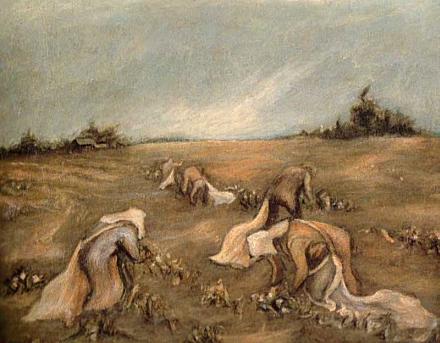
Cottonpickers
Jackson Pollock
1935
_______________________
Language Place Blog Carnival Edition 3
hosted by Michael J Solender at not from here, are you?
Vaches
contribution by Jean Morris
tasting rhubarb
(....)
Just the one house was still inhabited in the traditional way by family upstairs and cows below. A beaming, sleazy family, still working their land, tending their few vines, milking their two cows, scratching a poor living and I fear too often passing out under the apple trees drunk on their homemade wine and spirits. Not a romantic decay. Growing poverty. Premature ageing. Fear of the authorities – all too aware that the two little grubby sparrow daughters were seen as deprived and potentially at risk. Alcoholism is alcoholism, even if passing out in the orchard is a lot less dangerous and dreadful than passing out on a city street. But still, a defiant love of the land and of a dying way of life.
I never opened my books. Walked in the countryside until I was shattered, sat on the base of the war memorial in the little square watching my friends’ kids rush about and when they were tired sat them there beside me and told them stories in the quiet dusk....(more)
_______________________
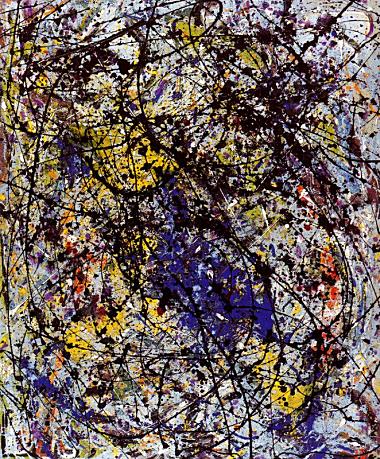
Reflection of the Big Dipper
Jackson Pollock
1947
_______________________
Tristan Tzara, the Lonely Maker
Willis Barnstone
exquisite corpse
Tristan Tzara lonely? Dada an-
archist, Résistance hero during the War,
can he have doubt? Abused by clique and clan
and foe? Is Peking Man about to soar
from his cave and attack the monocled,
gentle, three-piece bourgeois suit I walk
the streets of Paris with? I am cram filled
with pleasure as arm and arm we talk
of Bucharest where the Romanian Jew
was born. Je suis plus que l’histoire du vers.
They know me as the founder of the isms,
but I’m a poet, a French poet! Me a squirt
of twenty-one and he confides his woes?
In his sun apartment over Boule Miche
he pulls out copies of his books. He flips
through them. We sit and read outrageous hymns.
Willis Barnstone
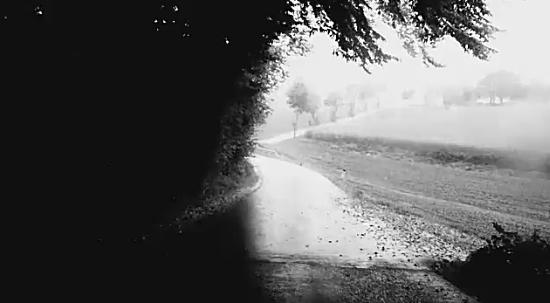
Gehen
a video tribute to Thomas Bernhard
dbprojections
embedded at this-space
Alternately I go back and forth
into the world of pigs and cows
and
the world of philosophers and cacophony
_______________________
from
The line the loss
Anne-Marie Albiach
English version by Peter Riley
the account would be blind
the spasms of the oracle structure
in the working of colours
the margin constrains the circle
the evidence on the ground
in a perfect liquidity
where the language
goes back on its word
the heart in the rhythm of denial
the light rejoins weakness
in the former declaration
the facts of the case withdraw to the horizon
a term found wanting
driving accusation of the air full of gestures
dedicated to the embrace
the subject shrinks
sleep bears them into the clearing
In scarlet draperies
they presided on the theme
of an absence
(....)
Flammigčre and The line . . . the loss [pdf] Anne-Marie Albiach
Translated by Peter Riley
Shearsman Books e-books_______________________

Ottawater 7
new writing by residents former and current, including Cameron Anstee, Michael Blouin, Jamie Bradley, Stephen Brockwell, Ronnie R. Brown, Faizal Deen, Monique Desnoyers, Rhonda Douglas, Amanda Earl, Laura Farina, Jesse Ferguson, Mark Frutkin, Katia Grubisic, Elisabeth Harvor, William Hawkins, a.m. kozak, Ben Ladouceur, Naomi K. Lewis, rob mclennan, Alcofribas Nasier II, Peter Norman, Roland Prevost, Monty Reid, Michael Eden Reynolds, Shane Rhodes and Chuqiao Yang, as well as interviews with Ben Ladouceur, John Lavery, Marcus McCann, Pearl Pirie and Sandra Ridley, and artwork by Danny Hussey, Dan Martelock, Hayden Menzies, IAMRURIK, Marc Adornato, Don Smith, Jeremy Reid, Rebecca Leach, Remi Thériault, Ryan King and Stefan Thompson.
- via rob mclennan
_______________________
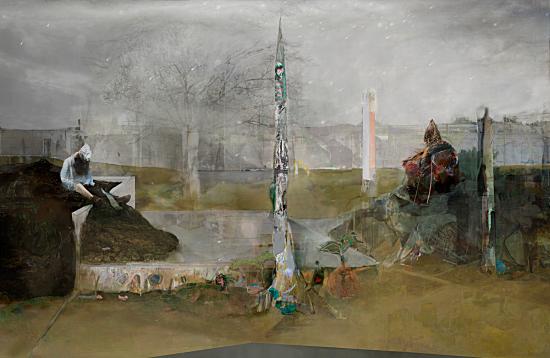
Three Fates
Alex Fischer
2010
_______________________
Pale Fire
Vladimer Naboakov
ifile pdf
PALE FIRE
(A Poem in Four Cantos)
CANTO 1
I was the shadow of the waxwing slain
By the false azure in the windowpane
I was the smudge of ashen fluff--and I
Lived on, flew on, in the reflected sky,
And from the inside, too, I'd duplicate
Myself, my lamp, an apple on a plate:
Uncurtaining the night, I'd let dark glass
Hang all the furniture above the grass,
And how delightful when a fall of snow
10 Covered my glimpse of lawn and reached up so
As to make chair and bed exactly stand
Upon that snow, out in that crystal land!
Retake the falling snow: each drifting flake
Shapeless and slow, unsteady and opaque,
A dull dark white against the day's pale white
And abstract larches in the neutral light.
And then the gradual and dual blue
As night unites the viewer and the view,
And in the morning, diamonds of frost
20 Express amazement: Whose spurred feet have crossed
From left to right the blank page of the road?
Reading from left to right in winter's code:
A dot, an arrow pointing back; repeat:
Dot, arrow pointing back...A pheasant's feet!
Torquated beauty, sublimated grouse,
Finding your China right behind my house.
Was he in Sherlock Holmes, the fellow whose
Tracks pointed back when he reversed his shoes?
(....)
_______________________

Samuel Palmer
b. Jan. 27, 1805
_______________________
Being Numerous:
Poetry and the Ground of Social Life
Oren Izenberg
princeton university press
from the introduction
Poems, Poetry, Personhood
[pdf]
(....)
Rachel Blau DuPlessis provides a vivid example of the multiplicity of grounds upon which our history currently stands in her definition of objectivism, which, as she writes,
usefully designates a general aesthetic position in modern and contemporary poetry encompassing work based, generally, on “the real,” on history, not myth, on empiricism not projection, on the discrete not the unified, on vernacular prosodies not traditional poetic rhetoric, on “imagism” not “symbolism” or “surrealism,” and on particulars with a dynamic relation to universals.
This description of a specific poetic movement produces the full effect of the twotradition model in microcosm. The terms it proposes are both useful and forceful: they do pick out recognizable elements both in poems that we know and in ones that we might discover. But the poetic position described here is unstable because the terms used to define it are heterogeneous in kind. Sometimes they evoke literaryhistorical movements (“imagism” vs. “symbolism”); sometimes they seem to reflect formal or functional commitments that transcend the boundaries of schools and histories (“discrete” vs. “unified” or “vernacular” vs. “rhetorical”); and sometimes they suggest philosophical commitments with strong ideological implications but no necessary aesthetic dimension (“history” vs. “myth” or “empiricism” vs. “projection”). Still, despite the various or shifting or incommensurable terms in which the division is described or conceptualized, the critical champions of each side do achieve virtual unanimity about the fact of the split, and an impressive (if imperfect) consensus about which poet belongs to whom.
This book began in my dissatisfaction with this state of affairs—
_______________________
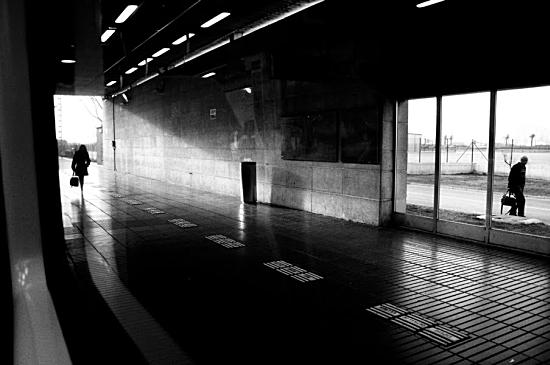
Copyright © Martķn Molinero
enantiodromia
the world becomes stranger
Martķn Molinero
_______________________
Journal of French and Francophone Philosophy
Vol XVIII, No 1
Julia Kristeva’s Maternal Passions
Kelly Oliver
Genetic Enhancement and the Biopolitical Horizon of Class Conflict
Wade Roberts
The World is One Great Hospital
David-Olivier Gougelet
Emerging from the Depths: On the Intensive Creativity of Historical Events
Craig Lundy
The Stirrings of a Stubborn and Difficult Freedom: Assimilation, Education, and Levinas’s Crisis of Humanism
Claire Katz
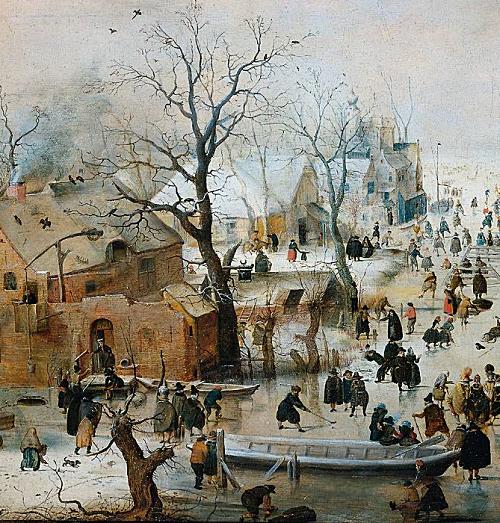 detail
Hendrick Avercamp
b. Jan. 25, 1585
_______________________
Old Man in Winter
Winter keeps coming, whether you're 18 or 38 or 58 or....
Morgan Meis
the smart set
... the phrase "now is the winter of our discontent" is so powerful that it often gets picked out of context and made to stand alone. When you do that, it seems as if "now" is the winter of our discontent. The winter of our discontent isn't going anywhere. It is simply the way it is right now.
Sometimes when I hear that line I even hear it as a statement not about "now" but about winter. If you think of it as a winter statement, you can almost replace the word "now" with the word "winter," i.e., "winter is the winter of our discontent." I don't take this as a simple tautology, "winter is winter," but the equation of winter the season with winter the mood. Winter, the season, is a time of general discontent. Winter, in its dreariness and decay, is the season of wanting things to be otherwise.
And yet, some part of us wants winter, some part of us glories in the winteriness of winter. ...(more)
_______________________
Printed Project 14: ‘the conceptual north pole’
Curator/Editor Lytle Shaw
_______________________
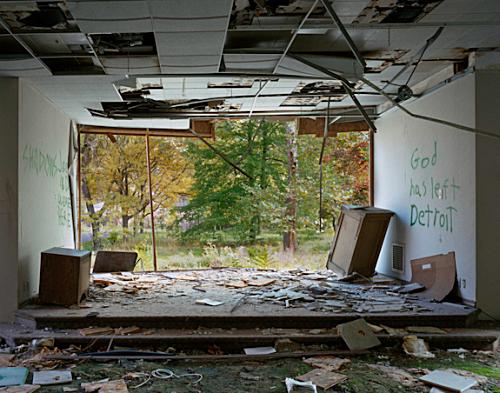 Photograph by Andrew Moore
Detroitism
What does "ruin porn" tell us about the motor city, ourselves, other American cities?
John Patrick Leary
guernica
_______________________
The Cruel Radiance
Photography and Political Violence
Susie Linfield
University of Chicago Press
excerpts 1 2
_______________________
About labeling photography as porn
Joerg Colberg
The problem with regarding the photography of suffering as ‘pornography’
David Campbell
_______________________
Logos Journal
a journal of modern society & culture
2011: Vol.10, Issue 1
Notes on the Counter-Revolution
Stephen Eric Bronner
Counter-revolution has gripped the American imagination. Neo-Conservatism was the dominant ideological expression of the new millennium and the Tea Party is today on the march. They have roots in the beginnings of American history and, like their predecessors everywhere, they are the reaction against the prospect of radical — if not always — revolutionary change. Modernity is the crucible in which both counter-revolution and revolution were forged. Both make reference to a notion of progress that speaks not merely to the growth of capitalism but to the privileging of individuality, social equality and the liberal rule of law. There never was a true ideological consensus. Counter-revolution and revolution always provided fundamentally divergent responses to the constraint on arbitrary institutional power. (....)
Rabid nationalists, religious fanatics, and bigots inspire the counter-revolution of our time. All of them resist the intrusion of political democracy and social equality into their societies. That is because these values inherited from the Enlightenment threaten their power and a set of outmoded legitimating traditions that are sanctified simply because they exist. Freedom is never a problem for the powerful. They already possess it. The “problem” arises only when freedom is demanded by the disenfranchised, the exploited, and the excluded. Reactionaries still fear — above all — the emergence of an individual insistent upon respect and equality who is intent upon knowing more, earning more, consuming more, and living life as he or she chooses. The counter-revolution knows its enemy, the same enemy it has always had, namely, the idea that things can be different....(more)
_______________________
He Gave Them Respect
Milton Rogovin: Portraitist to the People
Joann Wypijewski
counterpunch
(....)
He made beautiful photographs, printed with great love and skill, but he was doing so in his own little rivulet off the cultural stream.
If his photography did not turn people into victims nor did it make them heroes; neither were his shots grotesque, ironic, vulgar, stolen on the sly. Not quite a modernist by the rules of social realism, too aesthetically formal for the sixties, too direct for postmodernism, too gritty for that school of Salgado that merged poverty with the style of fashion photography, Milton was a man out of time. ...(more)
_______________________

Spurious
Melville House Publishing
more
Spurious by Lars Iyer
reviewed by Erik Morse
bookforum
In Spurious, Lars Iyer, a blogger and Maurice Blanchot scholar, explores the absurd and dysfunctional extremes of male bonding. Evoking literary duos like Don Quixote and Sancho Panza, and Othello and Iago, Iyer's portrait of two insufferable academics fumbling for enlightenment illustrates what the author comically calls the most honorable cruelty: friendship.
More dramaturgic than narrative, Spurious focuses on the prolix conversations of two supercilious Canadian critical theorists, W. and Lars, as they meander across Europe and sift through the history of continental philosophy. W., appropriately christened, in the high-modernist tradition of Kafka, as a single letter, is the alpha male—a pompous authority on German existentialism (though from Toronto, he considers himself "old European") who regrets his seduction by the novel, preferring the inviolability of calculus and God. Lars, on the other hand, is slovenly and undisciplined; his only redeeming trait, according to his best friend, is a total lack of shame. While W. pontificates, Lars can only muse; while W. aspires to "genius," Lars is content with his low-level academic status. To W., the only thing more despicable than Lars's mental and physical languor is his modest domicile, unkempt and lately infested with mold—a portent of something sinister for the frustrated existentialist. "You are the sign of the End," W. announces to his friend mockingly, with the apocalyptic drama of a Talmudic prophet....(more)
The A to Z of SPURIOUS: Peter Andre to Maurice Blanchot
Dennis Loy Johnson MobyLives
_______________________
he-you-i: Who’s thinking, anyway?
Review of Every Day in the Morning (Slow) by Adam Seelig
Camille Martin
(....)
Seelig’s shifting points of view remind me of Apollinaire’s “Zone,” a poem whose alternations among first, second, and third points of view have been associated with cubism. Some have interpreted these shifts as symptomatic of the modernist rupture of the self into expressions of self-alienation brought about by cultural forces of urbanization and technology. I’ve always felt that this argument is insufficient to explain the fracturing of the traditionally consistent point of view in modernist literature into a prismatic investigation of subjective experience. Call me an optimist, but I’m drawn more to Mary Ann Caws’ interpretation of the shifting points of view in “Zone”: “the pronominal zig-zags vibrate within the text, creating a warmth of contact between narrator and reader, drawn into the poem”.
And to me, this is the effect of Seelig’s shifting points of view in Every Day, as the “he-you-i” flow at the opening demonstrates, for the reader is implicated in Sam’s dialogic “you.” Thus the boundaries between points of view are permeable, as are the resulting boundaries between narrator, character, and reader....(more)
Just Twelve Bars: On Adam Seelig's Every Day in the Morning (Slow)
Lemon Hound
Seelig reading Every Day in the Morning (slow)
1 2 3
youtube
Adam Seelig is artistic director of Toronto's
One Little Goat
...Towards A Poetic Theatre...
_______________________
E-journals: their use, value and impact -
Phase One report [pdf]
Phase Two report [pdf]
Research Information Networkvia Charles BaileyDigitalKoans
_______________________
 
Denise Grünstein
via (OvO)
_______________________
Canada in Afghanistan: The Big Lie machine
Murray Dobbin
_______________________
My day passes between logic, whistling, going for walks, and being depressed. --Wittgenstein
- via

Unterer Truchsessweiher
Axel Hütte
2004
1 2
via junk for code
_______________________
Three Poems
Grzegorz Wróblewski
Translated from the Polish by the author and Malcolm Sinclair
Shampoo 38
Portions
For this bad day, which has just begun.
For this one shall to the kiosk after the well-known thing.
For this triumphant home-coming with the well-known
thing in the dust-coat’s inner pocket.
For those first, so pleasant buzzings from within.
For this depression caused by the following buzzings,
which are no longer so pleasant.
For this recovering anew.
For surviving however.
For this there is a little left.
For this one shall again to the kiosk after the well-known thing.
And in the end, for this that’s even without reason.
...(more)
SHAMPOO
10th Anniversary Issue
_______________________
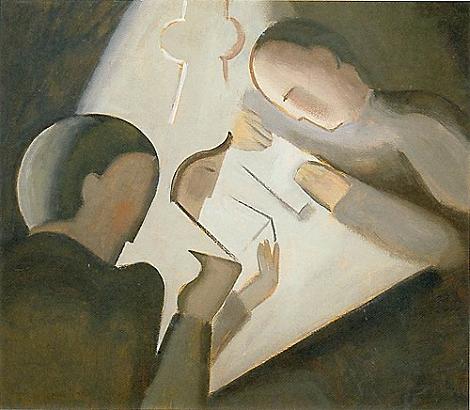
Readers under the Lamp
1913
Willi Baumeister
_______________________
The Forgotten 19th-Century Russian Great
David Auerbach on Nikolai Leskov
quarterly conversation
Of the great Russian prose writers of the 19th century, Nikolai Leskov was an outsider. He was not a member of the gentry, he lacked a privileged education, and he wrote about common serfs and the country clergy in their own language. He managed to alienate both the left and right wings of the Russian intelligentsia early in his career, and though his work was popular, critics dismissed it. His work was capable of great darkness and brutal cynicism, but it lacks the angst, romantic and existential, present in so much other prose of the time. (Still, one of his stories was so controversial in its criticisms of the Russian church that it was only published decades later.) And Leskov himself was confused enough as to his own strengths that he said that his brilliant storytelling abilities would be forgotten in favor of his ideas, when, in fact, his legacy lies in the unique qualities of his stories, which are hilarious, unpredictable, surreal, and often baffling.
Walter Benjamin and Irving Howe have both paid great tribute to Leskov (Benjamin’s essay characteristically seems to have more to do with Benjamin’s obsessions than with Leskov himself), but neither of them quite characterizes the sheer peculiarity of Leskov’s best work, where the narrative material is subject to perversion along the lines of Euripides, Kleist, Gogol, or Kafka, though with far less malevolence. Leskov’s structural perversities are in service of a particular, peculiar form of morality, one not as doctrinal or particular as Tolstoy’s or Dostoevsky’s, but one that celebrates humility in the face of fate....(more)
_______________________
The Telestial Kingdom
Brad Zellar
Your Man For Fun In Rapidan
(....)
You are one who has been waiting
for that one call your entire life.
Everything you ever tried was invested
with hope, and that hope can be
generally summarized by an expectation
that you would receive the one call
you've been waiting for your entire life.
And now your phone is in the toilet.
Sometimes you suspect that you spent
your whole life praying to the wrong god.
Or that your prayers were all wrong.
Or that there is no God.
If you're lucky you won't spend too much
time on such nonsense and you'll fall asleep
and dream that you are riding a bus
though the slums of heaven, and the slums
of heaven, it turns out, are populated
by the souls of cartoon dogs who have been
stripped of their clothing, forced to walk
on all fours, and eat luggage, lingerie, jewelry,
and all the other things people try to bring
with them to heaven but no longer need.
...(more)
_______________________

in plato’s cave
1972
Robert Motherwell
b. Jan. 24, 1915
_______________________
A Philosopher of Religion Calls it Quits
Goodbye to All That
Keith Parson
(....)
I have to confess that I now regard “the case for theism” as a fraud and I can no longer take it seriously enough to present it to a class as a respectable philosophical position—no more than I could present intelligent design as a legitimate biological theory. BTW, in saying that I now consider the case for theism to be a fraud, I do not mean to charge that the people making that case are frauds who aim to fool us with claims they know to be empty. No, theistic philosophers and apologists are almost painfully earnest and honest; I don’t think there is a Bernie Madoff in the bunch. I just cannot take their arguments seriously any more, and if you cannot take something seriously, you should not try to devote serious academic attention to it. I’ve turned the philosophy of religion courses over to a colleague. ...(more)
the Secular Outpost
_______________________
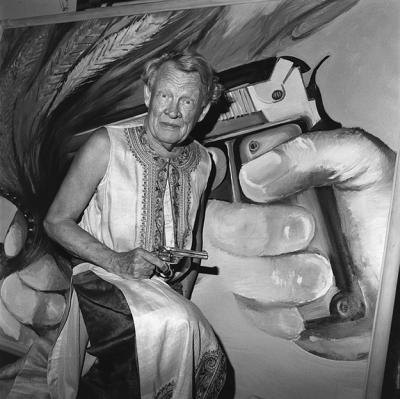
guns
Rosalind Solomon
_______________________
The Free Marketeer Origins of the Attacks on Science
Naomi Oreskes
Ethical Technology
The U.S. scientific community has long led the world in research on such areas as public health, environmental science, and issues affecting quality of life. Our scientists have produced landmark studies on the dangers of DDT, tobacco smoke, acid rain, and global warming. But at the same time, a small yet potent subset of this community leads the world in vehement denial of these dangers. Oreskes documents the misuse of science, driven by free-market fundamentalist ideology, to mislead the public on matters ranging from the risks of smoking to the reality of global warming. The people the authors accuse in this carefully documented book are themselves scientists—mostly physicists, former cold warriors who now serve a conservative agenda, and vested interests like the tobacco industry.

Carl Larsson
d. Jan. 22, 1919
_______________________
In the Vulgate
Alan Deniro
Goblin Mercantile Exchange
I don’t want to be fine.
The desperation
of a presence incites.
the existent secrets in a coffeehouse jam band, in the
fundraiser for a child’s cancer (a pancake dinner, a silent
auction) a flyer, and the strip mall will last for a while, maybe
past my life.
Are we to spurn the redeemed verse his exorcism and
exactitude?
No, I haven’t
called for that.
The venison
crawls out of the woods, well…it can’t really be called a woods
anymore,
mostly brush, thistles sharp,
interspersed with trees too
young to remember the hangings all over. The creek dividing
through
with mercury alive in it, cesium
the roadmap of the water. The
wild rings curate instead
of cure.
...(more)
_______________________
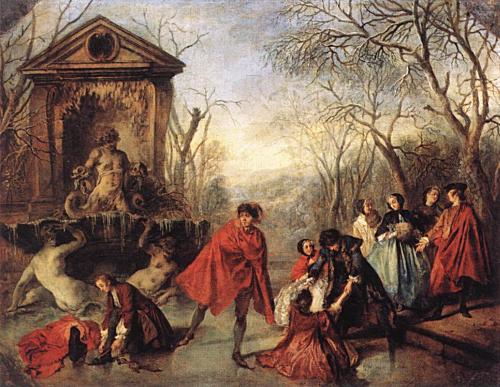
Nicolas Lancret
b. Jan. 22, 1690
_______________________
Three poems by Osip Mandelstam
translated (and read) by Stephen Dodson
qarrtsiluni
*
In the woods are orioles: the length of vowels
in tonic verses is the only measure.
But only once each year does nature lavish out
lagniappe duration, as in Homer’s metrics.
Like a caesura yawns this day; since morning
there have been peace and arduous longueurs,
oxen in pastures, and a golden languor
to draw out of a reed a whole note’s richness.
* * *
...(more)
regular denizens of the "s lot" will know Stephen Dodson wearing his other hat_______________________

The Old Man and the New Trees
Carl Larsson
1883
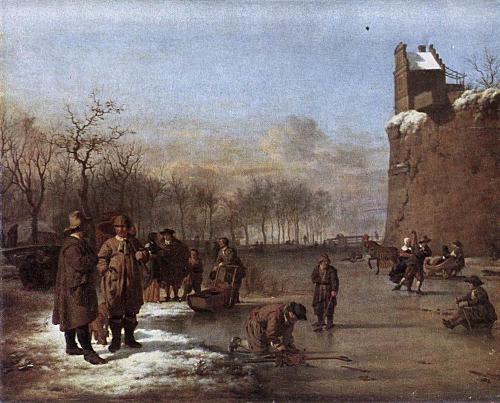
Amusement on the Ice
Adriaen van de Velde
1636-1672
_______________________
IS
Martin Burke
delphicgent
(....)
*
Whitman, your tungsten mind delights me
As
rooftop to rooftop
Where if not with a wild barbaric yapp
I sing in this fashion which ask for no approval
Thus I call you brother in this enterprise I seek not to define
But live
As if within the leavened bread
A word might be the rising yeast of spring
All lesser ambitions would condemn me
Nor attend with comely implications
And the train depart to towns not worth a mention
Only the self grant’s approval to the self
Only it can caution the mind not to bow
At hollow shrines
Thus in this morning dark
To partake of the peace of the world
Is a task as befitting as any that could be imposed
So that if I am listening to the river
I am listen to what it exactly Is
And not some counterfeit other
As the first streaks say dawn will come
As it does for my satisfactions
*
...(more)
_______________________
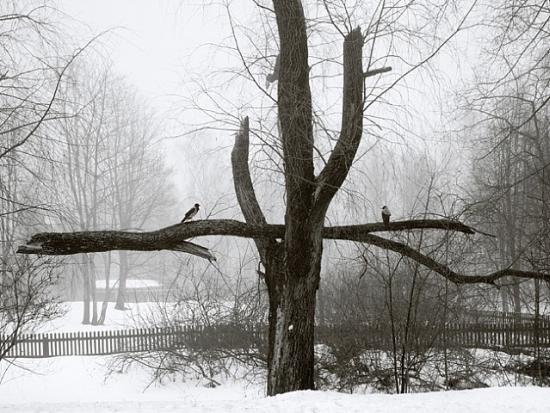
Helsinki
2002
The Extra/Ordinary World of Pentti Sammallahti
Nailya Alexander Gallery
1 2
via gmtPlus9 (-15)
_______________________
Marcella Durand at Elective Affinities
When the expiration
when the expiration—and cowardice to cite when
the expiration occurs and to write out of that fear
perhaps manufactured but almost certainly not
going to occur as we imagined it to occur, no
matter how many permutations we conjured
one after another in tired progression, and not
fruitful creationing—but that most all I know
feels doldrumed and seeing the endpoint
of their/our lines and all because of a spreading
amorphous spiral. The pressure of the deep
must be fierce but the pressure of escape
fiercer still. It’s from the interior and the
various voids and presences intertwined
make for—once a conduit discovered—
then here it is and we are—all is loose. ...(more)
Marcella Durand poems 1 2
_______________________

Frank Sutcliffe
1853-1941
_______________________
Poor Reason
Culture still doesn’t explain poverty
Stephen Steinberg
(....)
Notwithstanding the election of Barack Obama, the last 40 years have been a period of racial backlash. The three pillars of anti-racist public policy—affirmative action, school integration, and racial districting (to prevent the dilution of the black vote)—have all been eviscerated, thanks in large part to rulings of a Supreme Court packed with Republican appointees. Indeed, the comeback of the culture of poverty, albeit in new rhetorical guise, signifies a reversion to the status quo ante: to the discourses and concomitant policy agenda that existed before the black protest movement forced the nation to confront its collective guilt and responsibility for two centuries of slavery and a century of Jim Crow—racism that pervaded all major institutions of our society, North and South. Such momentous issues are brushed away as a new generation of sociologists delves into deliberately myopic examinations of a small sphere where culture makes some measurable difference—to prove that “culture matters.” ...(more)
_______________________
The killing fields of inequality
Göran Therborn
(....)
Few people are likely to argue that a society which awards 28 fewer years of life to people in the most disadvantaged neighbourhood (Glasgow Calton) than to those in the most privileged ones (Glasgow Lenzie, London Kensington and Chelsea) is a decent society. Is it a vindication of the superiority of capitalism that male life expectancy in capitalist Russia is now seventeen years shorter than in Cuba?[17] Social status hierarchies are, literally, lethal. Why should those on the lowest rungs of the Whitehall ladder have a four times higher likelihood of dying before retirement age than those on the top rungs? The USA – the richest country on earth, and the most unequal among the rich countries – has the third highest rate of relative poverty of all the 30 OECD countries (after Mexico and Turkey). Such relative poverty means being excluded from many parts of the social and cultural life of your society. But the US also scores badly on absolute poverty rates: the poorest tenth of the US population has an income well below the average poor of the OECD; the income of this group in the US is lower than that of the poorest tenth in Greece.
The transformation of capitalist finance into a huge global casino is what has created the current economic crisis, which has put hundreds of thousands out of employment and led to demands for billions of pounds of taxpayers" money. In the South the world crisis is bringing more poverty, hunger, and death. The effects of run-away distantiation are no longer defensible – if they ever were – by reference to fans" infatuation with their indulged stars.
The stretching social distance between the poorest and the richest diminishes social cohesion, which in turn means more collective problems – such as crime and violence – and fewer resources for solving all our other collective problems, from national identity to climate change. Western Europe – east of the British Isles, west of Poland, and north of the Alps – is still the world's least inegalitarian area, and has relatively high levels of social cohesion. For an experience of the full power of inequalities, you should look at the violence and fear of many South African and Latin American cities. ...(more)
_______________________
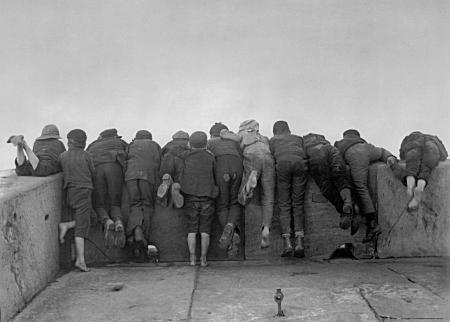
Frank Sutcliffe
_______________________
The Emancipated Spectator
Jacques Rancičre
translated by Gregory Eliott
ifile pdf
_______________________
Literature and Exile
Roberto Bolańo
translated by Natasha Wimmer
(....)
Literature and exile, I think, are two sides of the same coin, our fate placed in the hands of chance. "I don't have to leave my house to see the world," says the Tao Te Ching, yet even when one doesn't leave one's house, exile and banishment make their presence felt from the start. Kafka's oeuvre, the most illuminating and terrible (and also the humblest) of the twentieth century, proves this exhaustively. Of course, a refrain is heard throughout Europe and it's the refrain of the suffering of exiles, a music composed of complaints and lamentations and a baffling nostalgia. Can one feel nostalgia for the land where one nearly died? Can one feel nostalgia for poverty, intolerance, arrogance, injustice? The refrain, intoned by Latin Americans and also by writers from other impoverished or traumatized regions, insists on nostalgia, on the return to the native land, and to me this has always sounded like a lie. Books are the only homeland of the true writer, books that may sit on shelves or in the memory. The politician can and should feel nostalgia. It's hard for a politician to thrive abroad. The working man neither can nor should: his hands are his homeland....(more)
_______________________
The Logic of Images
Essays and Conversations
Wim Wenders
Translated by Michael Hofmann
pdf available at Monoskop/log

Syl and Will on Riverbank
March ca. 1901
Harry E. Dankoler
Wisconsin Historical Images
Flickr
_______________________
Four Poems
Ethan S. Bull
exquisite corpse
This Is The Story
I have been a long time in this story of where I am.Now that I am back, this is the story of the yard, this is the story of Narcissus, this is the chair someone sat on in the fire, this is the vegetarian prawn sauce and these are the woodchips that come frozen in little plastic bags, these are the strange lines the pigeons walk in the sky tracing the worm paths, so this is the cigarette field where we grow the albino fruit, this is the tortilla at dawn, the instructions for your phone and the empty tea box beside the bed, these are the peanut shells I wrote your name on and your name piled up in a bowl, so this is the rain sound out on the roof, the sound of airplanes in the yard at dawn.
...(more)
_______________________
The Canadiana Discovery Portal
more than 60 million pages of information from 30 different library, museum and archive collections across the country.
Google-like search site connects 60 million pages of Canadian history_______________________

Milton Rogovin
1909 - 2011
Photo © Dennis C. Enser, Buffalo News
1978
Milton Rogovin ~ "Working Class Hero" Indeed
Jim Johnson
Milton Rogovin Social Documentary Photographer
Showcase: Milton Rogovin
Parting Glance: Milton Rogovin, 101
David W. Dunlap
Milton Rogovin, Photographing 'The Forgotten Ones'
npr

Appalachia
1969
Milton Rogovin
_______________________
9 Light Poems
Jackson Mac Low
2nd Light Poem: For Diane Wakoski -- 10 June 1962
I.
Old light and owl-light
may be opal light
in the small
orifice
where old light
& the will-o'-the-wisp
make no announcement of waning
light
but with direct directions
& the winking light of the will-o'-the-wisp's accoutrements
& lilac light
a delightful phenomenon
a delightful phenomenon of lucence & lucidity needing no
announcement
even of lilac light
my present activities may be seen in the old light of my
accoutrements
as a project in owl-light
II.
A bulky, space-suited figure
from the whole cloth of my present activities
with a taste for mythology in opal light
& such a manner
in the old light from some being outside
as if this being's old light cd have brought such a manner
to a bulky, space-suited figure
from the whole world of my present activities
at this time
when my grief gives owl-light
only
not an opal light
& not a very old light
neither
old light nor owl-light
makes it have such a manner about it
tho opal light & old light & marsh light & moonlight
& that of the whole world
to which the light of meteors is marsh light
all light it
no it's
an emerald light
in the light form the eyes that are making it whole from
the whole cloth
with no announcement this time.
...(more)
Light and Dust Mobile Anthology of Poetry _______________________

Self-Portrait with Dada-Kopf
(Dada Head)
1920
Sophie Taeuber-Arp
b. Jan. 19, 1889

Keitum-Kliff
1925 - 1936
Bleicke Bleicken
1898 - 1973
Sylter Heimatmuseum
The Europeana portal
press release
Today europeana.eu already offers access to more than 15 million digitised books, maps, photographs, film clips, paintings and musical extracts, but this is only a fraction of works held by Europe's cultural institutions.
_______________________
Third Person Singular
Rosmarie Waldrop
conjunctions
I says the speaker, the subject. I oppose thumb and index to invite you into discourse, my reality. And yours. She, the third person, is barred from speaking for herself. A pleasure almost like eating and drinking. Or love, for which the Oxford English Dictionary has no less than twenty-four columns of definitions. They neutralize emotion by see above, spilled semen, no point scored. Stored. Reward. We might think that meaning fixes a word’s place in the language, as anatomy or skin color that in the house or back of the bus, but relativity has put an end to absolutes of space and time. Still, we can compare parts of speech with lines on a map that have a different function each: frontiers, roads, rivers, meridians, merriment. This is almost as exciting as grammar. ...(more) _______________________
(....)
It seems to me that in non-pathological instances of embodiment, this interworld is taken for granted as a structure of the lifeworld. Being in the world means being exposed to inter-corporeality of bodily interaction. In certain atypical instances, however—anxiety, illness, phobia—the experience of the interworld assumes a foreground presence, affecting a disturbance in the stability of selfhood, such that the idea of the body as autonomous loses its certainty. Such a loss would, I think, be felt more acutely were it the case that the body in question refused to accommodate the existence of the other as other. In my understanding, agoraphobia is an exemplary instant of this refusal.
All of which is a thematic preview of things to come. ...
-
Dylan Trigg
_______________________
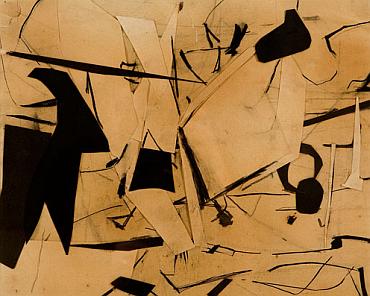
Concrete Improvisations
Collages and Sculpture by Esteban Vicente
Grey Art Gallery
via
1 2
_______________________
Elisabeth II
a play by Thomas Bernhard
translated by Douglas Robertson
(....)
HERRENSTEIN
It is inane thoughts alone that are ever uttered
They are never anything other than the utterances of a cripple
be a thought ever so well thought
it is nonetheless a crippled thought
be an utterance ever so well worded
it is nonetheless a crippled utterance
ties a napkin around his neck
the entire world is riddled with inanity
the entire world is crippled
but naturally there are skillful cripples
skillful cripples
continuing to eat his breakfast with Richard
...(more)
via TwitchelmoreSteve Mitchelmore
_______________________
Five Movements of the Soul and Hodgepodge
Habib Tengour
translated by Pierre Joris
Hodgepodge
Habib Tengour
translated by Pierre Joris
I.
At first sight, they are only incoherent games. Grotesque fillers. Show-off non-sense. Smacking of the platitudinous. Formal variations for the pleasure of an elite. An elixir! Today’s reader is bored faced with the complexity of the techniques put into play. He understands nothing of all these sassy-smart experiments with language. The newspaper speak differently to him. Each day a new catastrophe engulfs him in anguish. Blood all over the reported stories. A woof of unforeseeable elements where it is difficult to recognize the golden threads of the embroidery.
II.
The practiced constraint falsifies syntax. Intervals insinuate themselves into the distortion of the vocabulary. The narrative obeys no causality. Events follow each other without any change. This amuses some stylists who see in it an exemplary freedom. But such juggling is incapable of silencing the empty bellies. Everywhere one bumps into a dubious meaning. One looks for words with an edge to get the upper hand. In fact, the choices remain limited. The nouns prevail over the verbs and adjectives. Terrible toponyms. Chiseled obscenities. Irremediable blasphemies. Unhealthy scatologies. Repugnant names of animals or people. Earmarking of certain body parts. All of which teems in a triviality that provokes a slight disgust....(more)
On Translating Habib Tengour
Pierre Joris
_______________________
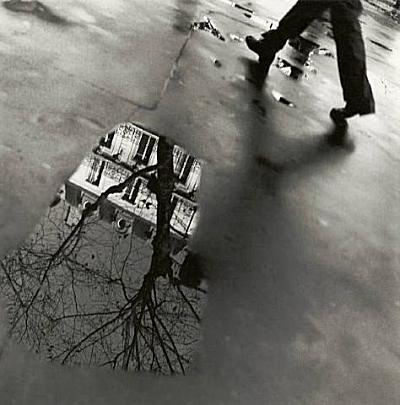
Place St. Augustin
Paris
Louis Stettner
_______________________
America’s Zen will have to happen without our conscious knowledge of it
Bardo Zek
(....) It is more than just the American Double-bind and the lie of freedom, it is more that just the accelerated development and overprotection of our children, it is more and more and more. That is really the problem. It is a glut. It is 9,000 double-bind messages per day; it’s seeing your life and all of your cares and all of your soul’s meaning reduced to a slogan for an insurance company and spooned right back at you and it is the 10,000 iterations of it all, the ceaseless yammer and the inescapability of it all – it is everywhere and it is on all the time and if you escape, if you go off the public road, if you try to get away from it for more than a short outing in a public park, you are breaking the law, trespassing upon some rich person’s pleasure grounds or golf course, you are a public menace. And, of course, the possibility of escape is never mentioned. It makes me think of the writing of Thomas Wolfe, the older, the wanderer in the ‘hot mazes’ of Brooklyn, who took trains coast to coast with the heart of a Whitman, in fact I believe he was trying to find Whitman’s America and find his place in that vision. What he actually found, though, was No Door.
It seems now that you are living in a world of creatures who have learned to live without weariness or agony of the soul, in a life which you can never touch, approach or apprehend; a strange city-race who have never lived in a dimension of time that is like your own, and that can me measured in minutes, hours, days and years, but in dimensions of fathomless and immemorable sensation; who can be remembered only at some moment in their lives nine thousand enthusiasm back, 20,000 nights of drunkenness ago, eight hundred parties, 4 million cruelties, 9,000 treacheries or fidelities, 200 love affairs gone by – and whose lives therefore take on a fabulous and horrible age of sensation, that has never known youth or remembered innocence and that induces in you a sensation of drowning in a sea of horror, a sea of blind, dateless and immemorable time. There is no door.
–Thomas Wolfe, From Death to Morning, p.4
...(more)
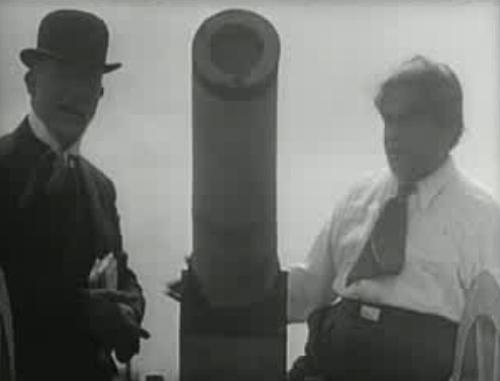
Entr'acte
(1924)
Director: René Clair
Script: Francis Picabia, René Clair
Photo: Jimmy Berliet
Music: Henri Sauguet
Cast: Jean Börlin, Inge Frļss,
Francis Picabia, Marcel Duchamp, Man Ray,
Darius Milhaud, Erik Satie, Mamy
Country: France
Language: French
Runtime: 22 min; B&W; silent
UbuWeb Film
_______________________
I knew that I could never again raise my voice against the violence of the oppressed in the ghettos without having first spoken clearly to the greatest purveyor of violence in the world today -- my own government. For the sake of those boys, for the sake of this government, for the sake of hundreds of thousands trembling under our violence, I cannot be silent.
-
Martin Luther King, Jr. 4 April 1967
_______________________
History Lesson(s)
The Business Affairs of Mr. Julius Caesar
a novel fragment by Bertolt Brecht, written between 1937-39.
courtesy of Landscape Suicide
And yet, that's how everything was done. At the appropriate time, when investigations on account of embezzled money were threatening, one always repeated the threat of the foul air from below, mumbled something about revolution, made a vague gesture in the direction of the suburbs. The police understood then, and became more tactful. An incidental mention of the hungry masses (in terse military prose), and the Senate hailed again. One was naturally against this stinking tide oneself; one wiped off with disgust the dirt that had splashed on one's toga. One knew that they would use their 'liberation' to set their crippled bastards on the Vestal Virgins' laps, to grow radishes instead of chrysanthemums in the glasshouses, to seal the holes in their barracks with priceless Greek canvases, to shit on grammar — always excused by a couple of literati on account of their neglected education. One knew, all that; one had Greek culture. One knew, but one had to make politics....(more)
History Lessons and Brecht's The Business Affairs of Mr. Julius Caesar
in Landscapes of Resistance
The German Films of Daničle Huillet and Jean-Marie Straub
Barton Byg
UC Press E-Books Collection, 1982-2004
_______________________

Self-Portrait
Florence Henri
1928
Androgyny and the Mirror:
Photographs of Florence Henri, 1927-1938
Melody Davis
_______________________
Poetry and Voice: The Urge to Nowhere
David Herd
PN Review 197, Volume 37 Number 3
(....)
‘The urge to nowhere’ is a phrase out of John Ashbery’s poem ‘Sunrise in Suburbia’:
Flatness of what remains
And modeling of what fled,
Decisions for a proper ramble into known but unimaginable, dense
Fringe expecting night,
A light wilderness of spoken words not
Unkind for all their aimlessness,
A blank chart of each day moving into the premise of difficult visibility
And which is nowhere, the urge to nowhere,
To retract this statement, sharply, within the next few minutes.
My intention here is not to read Ashbery as providing a migrant poetic, though one could: here, for instance, one might find it in the syntax, the movement into ‘difficult visibility’, the ‘flatness of what remains’, the sharp injunction to ‘retract’. My intention, rather, is simply to seize Ashbery’s phrase, ‘the urge to nowhere’, as a statement of an impulse that seems increasingly necessary. It is an impulse that has received philosophical amplification of late, amplification whose express purpose has been to reconsider the construction of the relation between voice and place. ...(more)
via The Page
_______________________
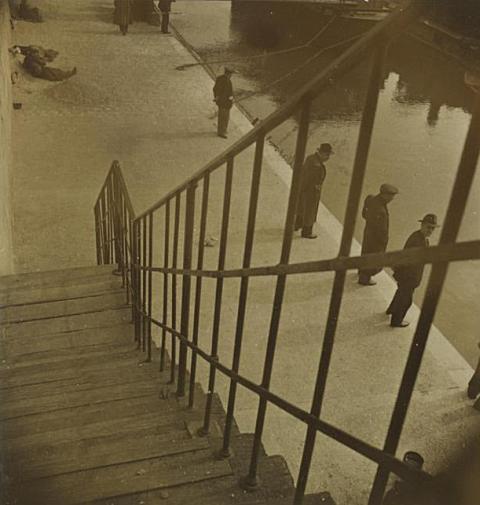
Sur les quais, Paris
early 1930s
Florence Henri
(1893-1982)
via
_______________________
Parables for the Virtual: Movement, Affect, Sensation
Brian Massumi
google books
a pdf version is available at
Monoskop/log
Living archive of writings on art, culture and media technology
_______________________
Keeping the Wound Open
Seįn Sheehan on What Ever Happened to Modernism?
(....)Disenchantment with the world is the wellspring of Modernism for Josipovici, the sense that something important has been lost, the loss of objet petit a, and feeling the loss with a fineness that only art can render with the visceral quality it deserves. This awareness did not suddenly erupt and its beginnings are traced back to the sixteenth century, neatly exemplified in two of Dürer’s woodcuts: ‘Melancholia I’ is where we are today; ‘St. Jerome in his Study’ is what we have lost. What takes place with Modernism proper is artists becoming painfully aware that they are creating emblems for an external world, not mirroring it, not lining them up against it like a ruler making a measurement. Novels with their naturalistic settings, realistic characters and psychological verisimilitude are good at making the reader think otherwise; before you know it you’re wallowing in the feelings and relationships of the characters and emoting all over the carpet....(more)
Irish Left Review_______________________

Entr'acte
_______________________
Why do I do what I do?
Lauren Hall-Lew
Lecturer in Sociolinguistics, University of Edinburgh
(....)
We sit with our digital recorders and microphones in the living rooms of kind strangers who tell us the highs and lows of their life story, and we listen. Then we walk away, out of their home, out of that community, into our office (and in my case, across a continent and an ocean), and in many cases we may not see those strangers again.
We didn’t fix their problems, we didn’t feed their children (although the lucky among us have research grant funds to at least pay them for their time), and we certainly didn’t fix their car. We take those stories and we turn them into research papers about the ‘construction of local ideologies’ or the ‘progression of sound change’ or the ‘negotiation of social meaning’. Who cares? Do they care? How can we justify asking a tax-based scientific funding agency to pay for such an endeavor? How can we convince undergraduate students that spending your life doing something like this is something worthwhile?
I have two thoughts on this, one at the level of the person, and one at the level of society....(more)
Popular Linguistics MagazineVolume One, Issue One
DS Bigham, Editor in Chief
via languagehat
|

 Janus Head
Janus Head

 The Age of Briggs & Stratton
The Age of Briggs & Stratton








































